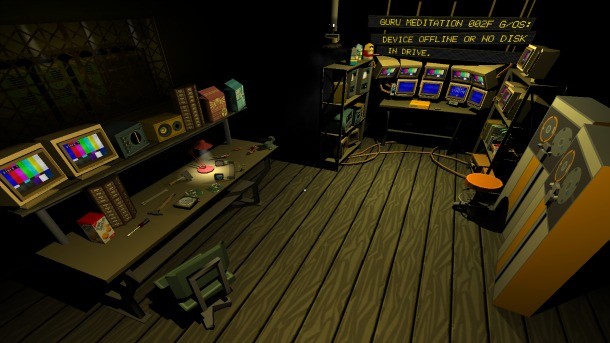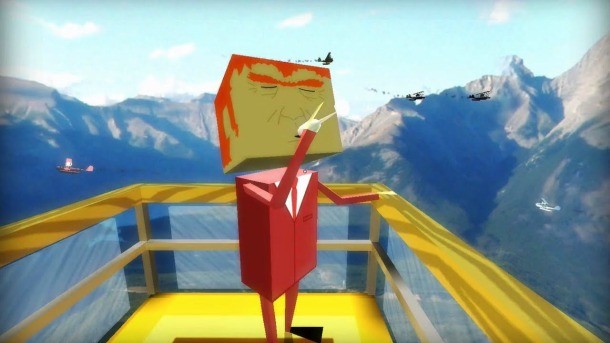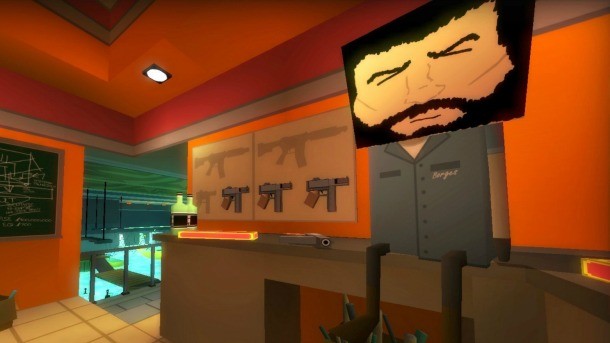We Take A Look Inside The Quirky Worlds And Exciting Heists Of Blendo Games

Last week, indie developer Blendo Games released Quadrilateral Cowboy, a hacking-based puzzle adventure long in development, and I kind of fell in love with it. Quadrilateral Cowboy isn't Blendo Games' first title, however. The developer has been releasing strange, often narrative-focused games since 2008. We decided to run through several of the most notable games in Blendo's catalog and talk to the man behind the studio, Brendon Chung, about the influences that helped create the unique aesthetic shared across these games.

Gravity Bone (2008)
Though Gravity Bone isn't Blendo's first game, it's the first to use what would become the trademark aesthetic also featured in Thirty Flights of Loving and Quadrilateral Cowboy – people presented as blocky caricatures instead of photorealistic models and a thematic fascination with manuals and espionage. The short game follows the adventures of a spy completing a series of objectives, like delivering a poisoned drink to a target at a party, before the spy eventually killed by a mysterious woman. It's an interactive story that's told in a surreal matter with smash cuts and no intelligible dialogue. When I asked Chung about the motif of manuals that shows up in all three of his narrative games, he talked about taking apart machines and putting them back together when he was a child:
I just loved that world of seeing how things worked, fixing them, repairing them, maintaining them, and manuals were the secret tools to figuring out all that stuff. They were the next best thing to magic and having that power was just really compelling to me. When I make my games now, there’s something really satisfying about having the information for the player there, they just have to read these incantations to know how things work better. Like, it’s not hard to do this stuff, you just need to find the manual and do it yourself, and there’s something really empowering about that to me.
You can download Gravity Bone here for free.

Thirty Flights Of Loving (2012)
Billed as a "short story" in its trailers, Thirty Flights of Loving is a narrative-focused game centered around a crew of criminals preparing for a heist. Playing as one of the characters, the player experiences the set up for the job and the bloody aftermath, but doesn't actually play through the heist itself. The story is told out of sequence with smash cuts, which creates a dreamy effect, as does the lack of discernible dialogue between characters. When I asked him about the surreal storytelling inherent in these games, Chung talked about the importance of trusting the player:
Have you seen the show The Wire? The Wire is a really interesting show in that it’s a show I bounced off of the first two or three times because what it does in the first episode is that it just throws you into the deep end of the pool. It just starts talking about these events that have happened already, all this terminology, all this sort of jargon and procedural stuff. But then on the third time I watched it, it clicked. "You’re kind of trusting me that I will figure out, trusting me to absorb all of it and just respecting that I will have the ability that I will catch on and hang on for dear life and figure out what you’re doing."
And when it does click, it clicks real hard. They’re just really throwing me in there and expecting me to figure it out myself. I wanted to achieve that same thing, like, "I’m gonna trust that you’re going to catch on to this and it’s okay if you don’t, but if it works for you then that’s great. And I think that’s gonna work better than if I try to connect things for you, just if you can figure things out on your own."
Chung also talked about his fondness for heist fiction and why it's taken center stage in his last two narrative games.
There’s something about that feeling, you're not an invincible person, that instead you’re this sort of fragile thing that can break at any moment, but that you’re able to still complete your task by not using brute force but by subverting things, by seeing the cracks in the system. There’s just something really satisfying about that: seeing how systems work and then exploiting them.
You can grab Thirty Flights of Loving off Steam here.

Quadrilateral Cowboy (2016)
Unlike Gravity Bone and Thirty Flights of Loving, Quadrilateral Cowboy will probably take you around four to five hours to complete, and isn't completely narrative focused. Instead, you play as a group of robbers in the '80s pulling off heists in virtual space with a laptop and a series of espionage-inspired gizmos, like a suitcase hiding a gun turret and a small controllable robot that can infiltrate vents. Every heist is comprised of a series of missions where you have to use your hacking skills to solve puzzles and make off with the loot. In keeping with the aesthetic established by Gravity Bone, there is no dialogue and story is told through a series of action sequences where the player observes the environments in search of nuggets of story.
During our interview, Chung spent some time talking about how he wanted Quadrilateral's take on hacking to be different from other games that present hacking as a sort of minigame:
I think that I grew up using DOS; Windows wasn’t a thing at that time. In order to make a game work back then it was this giant ordeal. You had to shift around memory and turn on memory managers and trick your system into playing Wing Commander, basically. And….i wouldn’t say it was “fun,” but there was definitely something that was satisfying by the end of it, that you actually had to exploit your computer somehow to play games. There’s something satisfying about figuring out the system and making it work. Hacking is usually abstracted down into minigames, which is completely understandable because you want to make the system work within this accessible game and make it very streamlined and accessible to use. But I intentionally wanted to make something that included hacking but very intentionally wanted to touch on that same clunkiness of getting Wing Commander to work on a 386 computer and just making it really chunky, because I think that’s something that we don’t have anymore – for a good reason of course – but there’s also something sort of magical about doing that sort of stuff.
You can read my review of Quadrilateral Cowboy here or watch us play it in our Test Chamber.

Get the Game Informer Print Edition!
Explore your favorite games in premium print format, delivered to your door.
- 10 issues per year
- Only $4.80 per issue
- Full digital magazine archive access
- Since 1991









